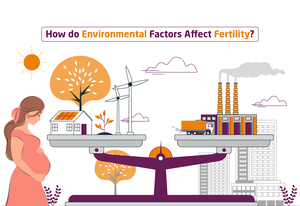More from Dr. Nalini Mahajan
More in Politics
Related Blogs
Archives
Social Share
How do Environmental Factors Affect Fertility?
Body
The environment in which we live has a significant impact on our health, including our fertility. A growing body of research has shown that exposure to certain environmental factors can have adverse effects on reproductive health. In this blog post, we will explore the link between environmental factors and fertility, and what you need to know about how these factors can impact your ability to conceive.
What are environmental factors?
Environmental factors are external factors that can impact our health. These factors include things like air pollution, water contamination, exposure to toxins, and even lifestyle choices like diet and exercise. Environmental factors can have both positive and negative effects on our health, and they can be influenced by a wide range of factors, including geography, climate, and social and economic factors.
How do environmental factors affect fertility?
Environmental factors can directly impact fertility by interfering with the reproductive process. Exposure to toxins and pollutants can damage reproductive organs and disrupt hormone levels, making it more difficult to conceive. For example, exposure to lead and other heavy metals can cause sperm abnormalities, while exposure to pesticides and other chemicals can disrupt ovulation and impair fertility in women.
Environmental factors can also indirectly affect fertility by increasing the risk of health conditions that can make it harder to conceive.
What are some common environmental factors that can impact fertility?
There are many environmental factors that can impact fertility, including:
- Air pollution:Exposure to air pollution has been linked to a range of reproductive problems, including decreased sperm quality and quantity, and an increased risk of infertility and miscarriage.
- Water contamination:Exposure to contaminants like lead, mercury, and arsenic can impact fertility by interfering with hormone levels and causing reproductive problems.
- Pesticides:Exposure to pesticides has been linked to an increased risk of infertility, as well as other reproductive problems like miscarriage and birth defects.
- Radiation:Exposure to high levels of radiation can damage reproductive organs and impair fertility.
- Lifestyle factors:Factors like diet, exercise, and smoking can also impact fertility. Poor diet and lack of exercise can contribute to obesity, which is a risk factor for infertility. Smoking has been linked to decreased fertility in both men and women.
What can you do to reduce your exposure to environmental factors that impact fertility?
There are several things you can do to reduce your exposure to environmental factors that can impact fertility:
- Be mindful of your diet: Eating a healthy diet rich in fruits, vegetables, and whole grains can help reduce your risk of obesity, which is a risk factor for infertility.
- Exercise regularly:Regular exercise can help you maintain a healthy weight and reduce your risk of health problems that can impact fertility.
- Reduce your exposure to toxins and pollutants: Be mindful of your exposure to toxins and pollutants like lead, mercury, and pesticides. Use natural cleaning products and avoid using pesticides in your home and garden.
- Quit smoking: Smoking has been linked to decreased fertility in both men and women. If you smoke, quitting can improve your chances of conceiving.
- Get tested for environmental factors:If you suspect that you may have been exposed to environmental factors that can impact fertility, talk to your doctor about getting tested.
In conclusion, environmental factors can have a significant impact on fertility. By taking steps to reduce your exposure to toxins and pollutants, maintaining a healthy lifestyle, and getting tested if you suspect that you may have been exposed to environmental factors, you can improve your chances of conceiving and having a healthy pregnancy.
Read more: https://ferticity.com/how-do-environmental-factors-affect-fertility/











Comments